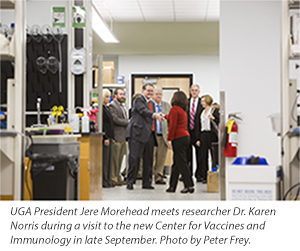
As inaugural research projects get underway in the new Center for Vaccines Immunology, excitement amongst the researchers and lab staff is palpable throughout the state-of-the-art facility.
The open-concept lab space sprawls across a newly renovated corner of what was once the University of Georgia’s Veterinary Teaching Hospital.
The “new lab smell” is distinct, and the broad research benches still house a few boxes of unpacked beakers and microscopes.
From Zika to seasonal and pandemic influenza, and HIV to whooping cough, the CVI’s mission is to understand basic immunology of infectious diseases and vaccine efficacy in order to build broader protection against emerging and re-emerging diseases.
CVI Director Ted Ross said finalizing the initial lab renovations and hiring the original faculty in 2016 were huge steps toward his 3-year goal of operating a translational vaccine development center.
Though also immersed in his own research, which includes a focus on adapting a universal flu vaccine, Ross fosters synchronization across the four teams and guides the CVI’s cohesive vision. “I help to get people in harmony and to reach their potential,” he said.
“We are reaching a critical mass with our immunology faculty working on infectious disease pathogens and vaccinations,” said Ross, who is also the Georgia Research Alliance Eminent Scholar in Infectious Diseases. “We started from scratch and are very new, but we have come together very quickly.” He plans to expand recruiting in 2017.
Karen Norris, who joined the CVI last fall as the GRA Eminent Scholar in Immunology and Translational Biomedical Research, agreed.
“Today we start the science,” she said.
The CVI’s open-concept lab space stimulates collaboration within and across the research teams, which was a big inspiration for not only the facility design itself, but also the hiring of the CVI faculty, who lead complementary immunology response research projects. The design concept helps with logistics like communication and flexibility, and inspires coordination, because researchers can see each other and move together as a unit, said Don Carter, CVI research director.
Carter helps Ross facilitate the CVI and says his focus is to develop core shared lab space that will foster research collaboration. “You don’t have to do this [research] internally if you find the right collaborators and supporters,” he said.
A spirit of collaboration
What unites the CVI faculty, other than commitment to their solo immunology research, is their commitment to each other and to the success of the Center. They all cite the potential for colleague collaboration at a flagship research institution as their draw to UGA. “It’s fun to come to work,” said Eric T. Harvill, the UGA Athletic Association Professor of Medical Microbiology, who joined the CVI team last summer.
Colleagues agreed, noting that the enthusiasm and energy in the CVI are infectious. “Meetings go long for a good reason, and people stop you in the hall and tell you about a research development,” said S. Mark Tompkins, a professor of infectious diseases known for his work in flu and high-containment research. Tompkins became an official member of the CVI team in July and has established a lab within the facility. He also maintains his high-containment laboratory in the Animal Health Research Center.

Not yet a year into the CVI’s official launch, the research teams are already finding innovative ways to merge their research interests. The CVI’s four faculty members find harmony across their immunology research, particularly in the realm of respiratory infection.
Ross and Norris are collaborating on respiratory syncytial virus. Norris and Harvill are combining research expertise to examine Bordetella pertussis transmission in animal models. And, Ross and Tompkins are using overlap within their influenza modeling to stabilize a live flu vaccine that won’t require continuous cold storage.
“It’s impossible to do things as a singular lab,” Tompkins said. “We need a multi-disciplinary approach to look at other immunology aspects.” He pointed to Harvill’s microbiome research as a vital addition to the others’ viral focus.
Initial CVI renovations were supported by the Georgia Research Alliance, the UGA Office of Research, the Office of the Provost, the College of Veterinary Medicine and the Department of Infectious Diseases. Second phase renovations, expected to be completed this winter, include knocking down more walls to open up room for more lab space.
Ross’ goal is that by 2020 the CVI will serve as a core facility for immunology investigators across the University to test their research. With plans to merge academic and private business models, the CVI will drive vaccine development from the bottom up by facilitating every stage along the way for both animal and human samples—from research through clinical trials and data analysis, to regulations and licensing. Ideally the CVI will be open to any researcher or private business that needs a one-stop shop to help transform their research into treatment, said Ross.
“When I learned about the science that was going on at the College of Veterinary Medicine and the amazing growth that is taking place at UGA with infectious diseases, it was very scientifically enticing,” said Norris, who moved her program from the University of Pittsburgh to join the team.
The CVI researchers all agree that the facility is a natural extension of the well-established collaboration between UGA and the GRA, and that having Ross at the helm of a new immunology program is a vital step towards advancing global health.
